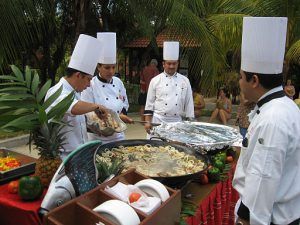Australia’s hospitality scene continues to be mouthwatering. Recent visa changes affecting chefs and cooks are not. What can restaurant and café owners do?
If primetime TV shows like My Kitchen Rules and MasterChef are anything to go by, Australia loves a good cook. Enjoying beautifully presented and delicious tasting dishes has become a national pastime.
Australia’s foodie scene is being powered by qualified chefs and cooks – without whom it would likely run out of steam. Restaurant and café owners typically employ local qualified staff who are Australian citizens or permanent residents. Sometimes though job vacancies can’t be filled locally which presents a problem for the restaurant. After all a skills shortage can directly impact on the growth of a business. When this happens business operators can look further afield to draw on international talent.
To do this, a business owner will need to sponsor an overseas candidate for a temporary or permanent work visa. This is not a decision taken lighting by employers. After all, the process of sponsoring is a significant investment for the employer.
“Smaller businesses are more likely to qualify as a sponsor for the Regional Skilled Migration Scheme than the temporary 457 visa”
In Western Australia, the tourism and hospitality sectors are helping to pick up the slack from the plateauing mining boom. Tourism Western Australia has been enthusiastically trumpeting the region’s local produce and talented chefs. Yet, like much of Australia, Perth has experienced a shortage of locally qualified chefs and cooks.
What had previously set Perth apart from Australia’s other larger cities was its status as a ‘Specified Regional Area’. This status enabled the city’s restaurant and café operators to sponsor qualified chefs and cooks through the Regional Sponsored Migration Scheme (RSMS).
The advantage of the Regional Skilled Migration Scheme to small businesses like cafes and restaurants is that it plugs a skills shortage. That’s because some smaller businesses are more likely to qualify as a sponsor for the Regional Skilled Migration Scheme than the temporary 457 visa.
For an employer to be able to sponsor a skilled person for a 457 visa, they must first qualify as an accredited business sponsor. This involves meeting criteria – criteria that is often out of reach for many smaller operators. For example, one of the requirements a business needs to satisfy is meeting one of two training benchmarks.
The employer can either pay 2% of the business’s payroll towards a training fund (Option A) or he or she must show that the equivalent of 1% of their payroll goes towards training Australian employees (Option B). Employing an apprentice is one way of meeting the Option B training benchmark.
“For business operators who cannot sponsor employees for a 457 visa, there is still the Employer Nominated Scheme”
Yet for a lot of smaller cafes and restaurants, supporting an apprentice is beyond their means. Many of these small businesses simply don’t employ enough staff to create the chain of expertise necessary to support an apprentice. Hence, for some smaller businesses, sponsoring a skilled worker from overseas for a 457 visa has been unfeasible.
Yet as of March this year, Perth’s regional status was removed and, along with it, the chance for smaller restaurant and café owners to use the Regional Skilled Migration Scheme as a way of addressing their skills shortages.
For business operators who cannot sponsor employees for a 457 visa, there is still the Employer Nominated Scheme which grants the sponsored employee permanent residency in Australia. Though these visas typically take longer to process than 457 visas, the Employer Nominated Scheme, if successfully granted, offers more certainty for both employer and employee.
For those business operators who can sponsor employees for a 457 visa, visa changes announced in March provide them with some gristly food for thought. While chefs and cooks can still be sponsored for a 457 visa, their occupation now comes under the new ‘short term’ stream. This ‘short term’ stream limits the duration of their 457 visa to 2 years from what was four.
The changes announced by the Immigration Minister in March also served up a surprise side dish: a new one-off levy that business sponsors must pay towards a federal training fund.
Australia’s hospitality scene continues to be mouthwatering. However, reducing the time a 457 visa is valid for chefs and cooks – and adding a training levy on business owners – is less so. The Migration Institute of Australia has been working with Australia’s migration agents and lawyers to clarify what avenues are available to employers to address pressing skills shortages. It’s now the job of those migration agents and lawyers to deliver clarity back to their clients to make these changes at the very least a little bit easier to swallow.
Got a query?

